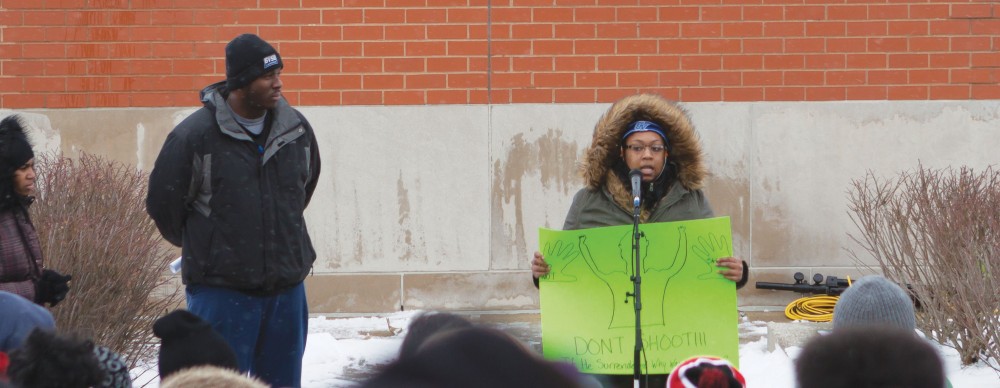Grands Rapids community seeks body cameras for police

GVL / Courtesy – GVSU University Communications
Dec 1, 2014
In the aftermath of the shooting of unarmed 18-year-old Michael Brown Jr. by police and the resulting grand jury decision in Ferguson, Mo., tensions have been high between communities and police nationwide. In Grand Rapids, community members are discussing solutions.
One potential solution involves requiring police to wear body cameras. In light of the Ferguson decision to not indict the officer who shot Brown, the community revitalization organization LINC is encouraging citizens who support the idea to come out and voice support for Operation Body Cam GRMI at the next Grand Rapids city commission meeting. The idea of this movement is to encourage city commissioners to require all GRPD officers wear body cameras.
“I do appreciate that it’s not just a police department issue, but a community issue,” said David Rahinsky, the chief of police at the Grand Rapids police department. “We are not going to be close minded to it.”
Rahinsky said he is more than happy to listen to the community and consider all of their ideas, however, he is not ready to commit to body cameras yet.
“At this point, I think it’s going to be very premature,” he said.
Rahinsky said he thinks the cameras can have positive effects, but he feels the solution lies with the police and public maintaining a good relationship before these problems arise.
“With us, it’s a continuous process,” Rahinsky said. “If you look to build trust when there’s a problem it’s already too late. Through our daily interactions we’ve built a reservoir of trust. We’re not waiting for those issues to arise. We work with the community each and every day.”
While the chief of police is open to hearing from the public, Rahinsky fears the cameras could potentially do as much harm as they could good.
“I have a concern that it’s going to have a chilling effect on people who need to reach out to the police department,” he said.
He cited, as an example, someone who needs to call police to report domestic violence. He feels that if people know they are being recorded, and that the information is obtainable by others, many would be less inclined to reach out to police when they need them.
Rahinsky also believes the cameras would not be as perfect as people hope.
“It’s not a 360 degree angle,” he said. “An officer can be aware of a threat the camera never picks up.”
According to Rahinsky, the benefits of body cameras would be more for communities that already have trust issues between the police and the public.
“Fortunately the city of Grand Rapids has worked hard to form a rapport with the public,” he said. “We are quick to address their concerns, but that’s not the case everywhere.”
For now, body cameras are also unlikely to be required at Grand Valley State University. According to Grand Valley Police Department Capt. Brandon DeHaan, GVPD is not currently considering the use of body cameras for its officers, and they have not looked into it.
“The Grand Valley police department has a great reputation, very professional,” Rahinsky said. “We appreciate the unique role they play in the city and we support their mission.”

























